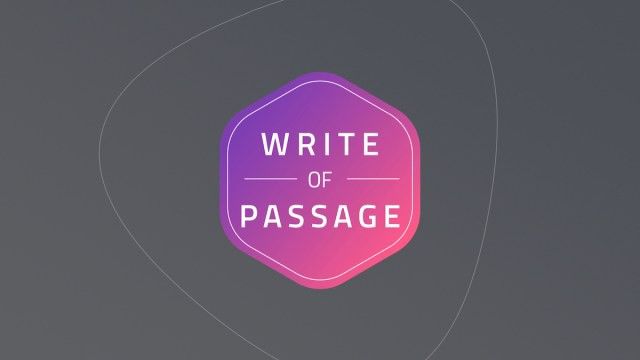Becoming a Citizen of the Internet
Thoughts after 2 intense weeks of OG writing course Write of Passage.

I took the plunge and signed up for the OG online writing course, Write of Passage.
It’s an intense 5-week cohort-based course designed to completely transform your approach to writing for the Internet Age. It’s not just about improving your style or finding your voice — it’s about becoming someone who writes online.
I’m 2 weeks in now, and I have to say I understand why this course has such a cult-like following.
I’d love to share some of my thoughts and takeaways so far. This will be valuable for you if you’re considering signing up for Write of Passage, or any online cohort-based course for that matter, as at the end of the day, it’s about the mindset shifts you need to make to start creating online.
A Relationship-First Model of the Internet
As a Millennial born in 1988, I am part of the ‘In-between Generation’. We spent much of our early lives without smartphones and social media but have been using them for so long we’d be considered natives. Yet writing and sharing anything online always felt too self-indulgent, too vulnerable, too awkward. “What will people think of me?”
Since I’ve started writing online, I’ve gone from passive consumer to active creator, and it’s been so much fun. I have found there’s nothing more satisfying than working on something that’s YOURS and making an effort to become better at it.
However, there’s another level to this game.
There are 2 groups of people. One group is benefiting from the Internet and using it as a way to build a better life, make connections, earn more money. The other group isn’t — trying to keep up with the rapidly changing world. — David Perell
It’s not enough to just put your stuff out there, crack your knuckles and sit back.
No one will come looking for you. You need to connect with people online, share your work and engage with theirs.
We’re entering a relationship-first model of the Internet, one where it’s becoming entirely normal to meet someone on, say, Twitter and then ‘jump on a Zoom call’.
I never thought I’d be that kind of person. Just a year ago, I would’ve rolled my eyes at that. “Get some real friends.”
Write of Passage focuses heavily on community and engagement with other students. I’ve done a few courses over the last year, and ‘community’ is the buzzword they all like to advertise. So far, Write of Passage is the only one that truly delivers on that promise for me. It’s more than just getting a bunch of people together — it’s about coming up with interesting ways to have them interact, and keep that energy and momentum going.
I’m meeting incredible people on paths I didn’t even know existed. Course creators, Indie makers, freelancers, people-who-combine-writing-with-full-time-jobs-and-kids. It’s invigorating to talk to people who are just as obsessed with writing as I am, and struggle with all the same worries and insecurities.
Look, I still have my reservations about the speed at which we’re moving our lives online. I am in equal measure excited and terrified by technology and the direction the world is moving in. But I don’t want to sit on the sidelines and dismiss it. I think that’s a foolish and dangerous thing to do. This is happening, whether we like it or not. Plus, technology is not inherently good or bad — it all depends on how we use it.
I’m not saying everyone should start writing online, but how about joining an online course in your field? Or creating a simple personal website? At least start by buying your own domain name — this is going to become more and more critical.
Leaning In Without Expectations
I’m a planner. I like to know where I’m going, how I’ll get there, and whether the views will be worth it. Otherwise, what’s the point?
This has always worked fine, but it's the safe route.
With writing, I have no idea what my long term goals are. I have to admit that is scary. I’m investing enormous amounts of time and effort into this whole thing, and that little voice in my head keeps popping up: “why am I doing this? What am I hoping to achieve?”
Friends also ask me. I can feel my cheeks flush and my mind go blank, causing me to stammer and say something quick and insignificant to remove myself from the spotlight.
It’s not that I don’t want to talk about it. It’s just that I don’t know the answer yet.
Pre-online writing, that feeling of embarrassment alone would have caused me to dismiss the whole thing and quit. “This is just not for me.” Now, I am learning to trust that something is happening and the effort is compounding.
All I know is I am so energised by the idea of building a life around reading, learning, writing, sharing, teaching. I go to bed giddy with excitement, eager to wake up early and write. I’ve stopped drinking for a while because I don’t want to waste time on hangovers that I could spend writing instead. I need to listen to this feeling and believe the path will become clear along the way.
This is a long game—one where the results can’t be forced, and take time and consistency before they show up.
So, instead of feeling bad for not knowing, I am allowing myself to experience as much as I can throughout the course, without expectations.
I have made ‘Leaning Into the Course’ my March Experiment (read more about my Year of Experiments here) — you wouldn’t expect me not to set any goal, right?!
That involves joining all the mentor sessions in my time zone, speaking up, actively engaging in the breakout rooms, getting on 1–1 calls with people.
If I don’t turn these things into little checkboxes on my Notion page, it’s too easy to convince myself it’s not that important. That I’m too tired to keep my camera on and share something with the group. That it’s okay if I leave the session midway if I don’t feel like doing the breakout exercise or feel shy about it.
Only by making it an experiment will I push myself to do it. That’s just how my brain seems to work.
Trusting My Judgement
As I’ve mentioned, the course focuses heavily on the community aspect, and a big part of that is feedback.
Giving feedback on other people’s writing is an interesting experience. The thought of “who am I to say this? I hardly know what I’m doing” pops up immediately. Well, if I thought it, then it must be valuable. So let me share it, and they can do with it what they like.
The course teaches me to trust my judgement and be confident about my input.
A helpful framework to provide feedback is C R I B S. As you’re reading, the idea is to look out for where you feel something is:
- Confusing -> re-write
- Repeated -> delete
- Insightful -> talk more about it
- Boring -> delete
- Surprising -> create tension around that moment
David Perell, the course creator, compares giving feedback to shooting a rubber band. You pull the rubber band back with a comment, a critique: “I don’t like this” or “This doesn’t work for me”. You want to be direct but respectful. But you don’t want to just point out what’s not working. By giving suggestions on how to improve the piece, you let go of the band. You shoot the writer forward, giving him positive momentum.
Writing can be a solitary experience, but this feedback element shows me the value of collaborating with other people. That’s again the power of the Internet.
Plus, it’s another area where I’m learning to lean in without expectations or predefined conceptions.
I was giving feedback on other people’s assignments, and I can hear the voice in my head: Isn’t this a waste of your time? Shouldn’t you focus on your own writing? You’re not even interested in this topic, so why are you spending time reading and giving feedback?
We’re so quick to dismiss things as “not for us”, missing out on new ideas, people, opportunities.
For the next 3 weeks, I’m shutting off that voice!
